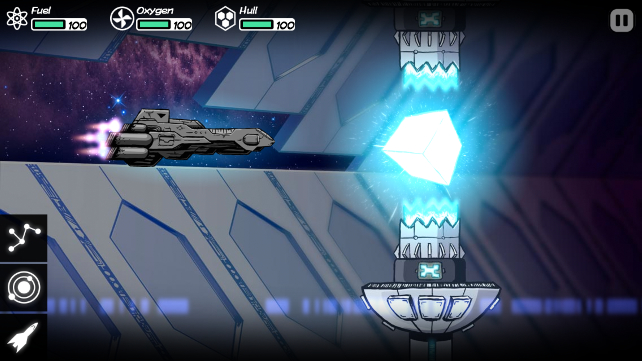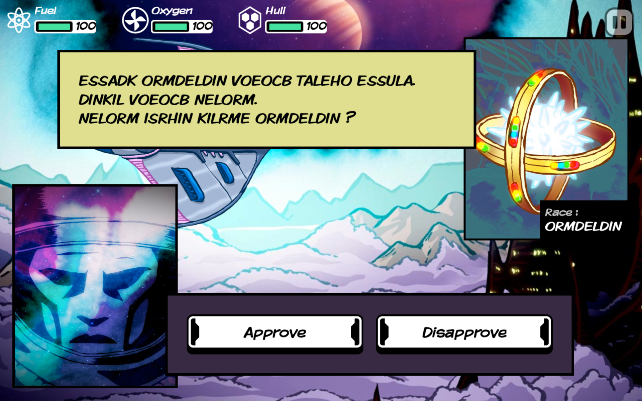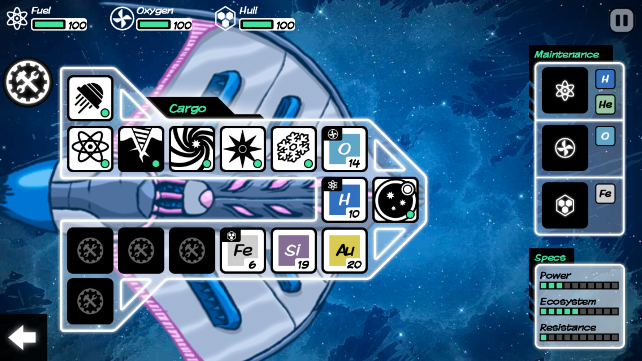
This week’s Cost of a Coffee see’s the Professor and Brian breaking the surly bonds of Earth and heading… Out There… with an espresso machine in space!
Podcast: Download
“Oh hello, I’m Professor Kelvin Harris, the resident scientist for Codec moments and you find me once again in my local coffee shop enjoying a minty mocha with my lab technician Brian here.”
“Hello. I’m allowed water as it doesn’t make me fractious.”
“I and many others would think nothing of walking into our local coffee emporiums and paying a few pounds for a foamy macchiato; so why do people shy away from paying the same amount for a mobile game? Together Brian and I are on a mission to bring you interesting and exciting mobile games that might give you many more hours fulfillment than that frappuccino. We want to divert some of those misappropriated funds; after all in the United Kingdom we spend around £2.5 million pounds on coffee every day and recently even the Italian Space Agency in conjunction with Lavazza and Argotec have developed an espresso machine for the International Space Station.
Dubbed the ISSpresso, it will be launched into orbit with Italian astronaut Samantha Cristoforetti in November, making her the world’s first baristronaut. I anticipate a Starbucks on the moon by 2015.”
“Would they pay moon tax to the Clangers Professor?”
“Hello, as the resident lawyer for Codec Moments I have strongly advised Professor Kelvin Harris not to provide a punchline to the aforementioned joke and remind you that Starbucks has always complied with all UK tax laws. We have also been contacted by the Clangers to clarify that they do not in fact inhabit the Moon, a common misconception since the release of the Noggin the Nog book ‘Noggin and the Moonmouse’. Clangers are not Moonmice and they have prepared the following statement:”
[Whistling]
“Also apologies if you’re outside of the UK and under the age of 30. Anyway, the point of the story is that you will soon be able to get a decent cup of coffee Out There!”
“That reminds me of the iOS and Android game of the same name Professor. Oh my goodness, you’ve done it again!”
“Oh yes Brian, I have more segues than the good people at segwayevents.co.uk.”
“Nice play on words too Professor! My Mam says I’m not allowed to play with words; she says a man shouldn’t mess with things that are beyond his comprehension. I’m not sure what she means by that.”
“In Out There from Mi-Clos, you play the part of an astronaut making the long trip from Earth to one of Jupiter’s moons, only to awake from cryonics to find that he’s no longer in our Solar System, he’s Out There! It’s a plot reminiscent of Lost in Space, Red Dwarf, Farscape or Star Trek Voyager…”
“Or Buck Tigers Professor.”
“Buck Tigers Brian? Did you write the script on your iPhone again?”
“Ducking autocorrect Professor.”
You are gifted the ‘Space Folder’ technology by a benevolent alien race, which allows you to travel between stars at great speeds as you begin your long voyage home. The distant galaxy in which you find yourself is procedurally generated, so no two games will be the same, as you set off towards the mission marker. There are three missions to complete in Out There, Red, Green and Blue, providing three different endings that unlock as you play the game. To get there you’ll need technology and supplies. Every action you take in Out There utilises some precious resource; travelling takes fuel in the form of Hydrogen and Helium, Oxygen depletes over time, Iron is used to repair your hull from damage and precious elements are required to create new and maintain new technologies that will be vital on your voyage. The game is a fine balance of these elements as you risk hull damage and loss of oxygen when you orbit a gas giant or sun to scoop up essential fuel; then you need to burn fuel to mine rocky planets for iron and other ores to ensure you can survive the next refuelling. Garden planets will let you refill your oxygen tanks; perhaps you can even take some reserves away with you and mine for precious metals if you have enough fuel to take off again. These bountiful worlds are also inhabited and you can converse with the aliens and learn their language bit by bit, so that conversations become more than just random attempts to nod or shake one’s head when they appear to be discussing the highest concepts of religion and quantum mechanics in Welsh.
Anomalies appear in some star systems and these alien space stations will often fully replenish your fuel, hull or oxygen so they’re worth a visit. Your ship has limited space and each technology takes up some of that, meaning yet more balance is required to ensure you have enough technology to assist you on your journey and enough fuel, iron and oxygen to actually complete it. It’s tough too because some of the tech you will learn along the way is great, letting you see exactly what is orbiting in each star system, whether there are hostile beings there, providing shields, improved scoops and mining drills, extending the range of your Space Folder and telescope; the list goes on and on.
Still you might stumble across the odd alien ship and these often have new technologies and more space so you can stretch out and head into the ether in relative comfort, for a while anyway. The game features a myriad of random encounters, both good and bad, which can damage or enhance your ship, deplete or refill your supplies and can bestow new technologies upon you or delete existing ones from your ship’s database; meaning you can’t rebuild it if it blows up, which it might in another random encounter. Luck plays such a massive part in Out There that it should really get a credit in the titles.
“Is it worth the ‘Cost of a Coffee’ Professor?”
“At £2.49, I would certainly say so Brian. The game is unique and interesting and has a narrative woven in using the loose mission structure and a sort of a captain’s log, that really becomes the musings of a man alone in deep space without access to women and hamburgers. The game can be a bit repetitive in the early stages even with the procedurally generated nature of it, but when you get further in and start to strike a balance between technology and supplies, you begin to feel like a true explorer of new and exotic worlds; hunting down garden worlds and anomalies, going boldly where no one has gone before. Then an asteroid hits your ship, obliterating your hull, emptying your fuel tanks and your computer forgets everything it’s ever learned.”
“Cost of a Coffee is a production of Codec Moments. For more information visit CodecMoments.com or search for Codec Moments on Facebook and Google+. If you can recommend a game that costs less than a cappuccino, e-mail prof@codecmoments.com.”
“See you next time.”





